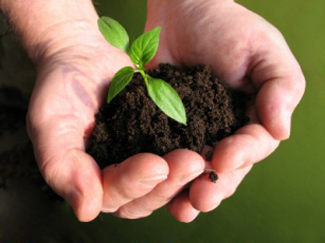 One of the best things about spring is the amazing assortment of flowers, trees and plants that bloom on Vanderbilt’s campus and in our area. Vanderbilt landscapers and groundskeepers take care to ensure that the products and practices they use to keep campus grounds healthy and vibrant do not have a negative impact on the environment down the road, a practice commonly known as “greenscaping.” Many of their tips can be used for home gardens as well.
One of the best things about spring is the amazing assortment of flowers, trees and plants that bloom on Vanderbilt’s campus and in our area. Vanderbilt landscapers and groundskeepers take care to ensure that the products and practices they use to keep campus grounds healthy and vibrant do not have a negative impact on the environment down the road, a practice commonly known as “greenscaping.” Many of their tips can be used for home gardens as well.
Native landscaping
Vanderbilt landscapers utilize plants that are native to the areas in which they are planted, taking into account how naturally wet or dry the soil is, the amount of sun an area gets daily, and how well the soil drains after rainfall. This allows the beds to require less maintenance and encourages healthier plants.
“We planted bearded irises in one of the beds at The Commons but found that the bed had a lot of runoff from a nearby building and always stayed wet,” said Laura Barker, a Vanderbilt horticultural specialist. “Bearded irises hate ‘wet feet,’ so we replaced them with a native iris called Southern Flag, which can grow in water. This planting is now thriving and looks great.”
Added Bill Randles, Vanderbilt sports turf manager, “When choosing vegetables to plant, it’s important to remember that fruit-bearing vegetables require the most sun, while root vegetables tolerate partial sun and leafy vegetables tolerate the most shade.”
Compost as fertilizer
The Vanderbilt Plant Operations grounds department collects leaf and landscaping waste from campus to compost at an on-site location, resulting in 97 tons of compost each year. The mature landscaping compost is later used to fertilize Vanderbilt grounds.
Home gardeners can make their own compost or buy it in bags or bulk, instead of purchasing chemical fertilizers, which eventually end up in local bodies of water. Randles also recommends organic fertilizers, “such as blood meal, coffee grounds, oak leaves, cottonseed meal and pine needles.”
Natural weed and pest control
Weeds are controlled on campus primarily through mulching and hand pulling, and chemicals are avoided whenever possible. Mulch not only helps to keep weeds down, but also assists with moisture retention and adds organic matter to the soil.
One can also use homemade, nontoxic weed killers, such as citrus oils or those made with vinegar, dish soap and salt.
“Small, ornamental pepper plants help keep small animals away from your gardens, while other common plants can be used to deter insects,” Barker advises.
Reduce irrigation needs
In addition to the decreased water needs realized through native landscaping and mulching, Vanderbilt uses a smart-irrigation system, which utilizes weather-sensing technology to determine when on-campus sprinklers are active and can be controlled remotely from a computer.
Installing a rain barrel, watering plants at night, and paying attention to the weather rather than setting sprinklers to automatic settings can drastically reduce the water used during at-home landscaping endeavors.
For more information about “greenscaping” at home, contact SustainVU, or visit the SustainVU website for sustainable landscaping resources.
Contact: Tiffany Renfro, (615) 322-9022
tiffany.m.renfro@vanderbilt.edu